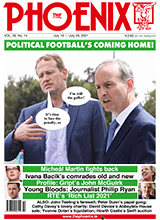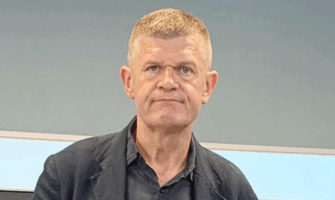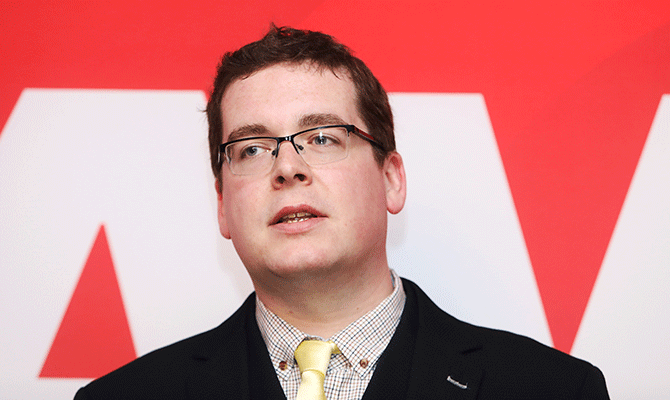
John McGuirk
THE LOUDEST, most contrarian and controversial political activist in Ireland has to be John McGuirk, editor of Gript, the right-wing website that exists to combat the liberal, secular media and its “headlong rush to the most extreme forms of liberalism”. McGuirk has been a member of more political parties and campaign groups than most, mixing with some extremist politicos in the process. But while avowedly conservative, he now presents as the voice of sweet reason in debates around racism, gay politics, abortion and the like. But McGuirk will need a good lawyer as well as common sense in his upcoming defamation battle with Chay Bowes, the man that helped to out Leo Varadkar’s leak of that confidential medical document.
McGuirk has lurched from one political pole on the spectrum of right-wing politics to another, including Fianna Fáil, Fine Gael, Declan Ganley’s Libertas and various campaign, the most recent being Save the Eighth. His political baptism appears to have been involvement with the Freedom Institute, a group of mainly Progressive Democrats members and his plan to render solidarity with US President George Bush’s 2004 visit to Ireland. McGuirk was in those days mainly involved with, and a member, successively, of FF and FG with whom he had a series of fraught conflicts and disagreements. In FG these conflicts involved his attacks on the then leader Enda Kenny and fleeting alliances, for example, with Lucinda Creighton.
Parallel to this involvement with establishment politics, and as he fell out with various personalities in the two parties, McGuirk began a steady march to the right, his first such dalliance being with the Freedom Institute in 2004. In 2005 he was recruited to Declan Ganley’s Libertas which helped to defeat the Lisbon Treaty Mark 1 in 2008 and which was supposed to sweep Europe in the 2009 European elections (Libertas crashed and burned instead). Even further to the right was McGuirk’s brief acquaintance, via social media, with the ominous sounding ‘Restore Rhodesia’ group which Goldhawk reported on in 2008. Then, McGuirk explained to Goldhawk that he was unaware of the website’s content, despite its name, but that he deplored the racism of that country’s regime under Ian Smith and would check out the website.
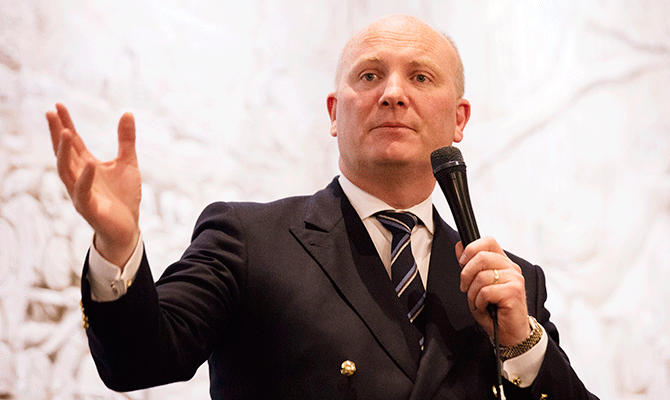
Declan Ganley
Throughout this exotic, right-wing journey a common thread has been McGuirk’s attachment to old-fashioned Catholic mores and his contempt for the liberal and secular agenda of the modern Irish establishment. But he is also a determined, traditional conservative. Along the way he has found himself on the same side as Youth Defence in various battles with godless forces, although he angrily denies membership of the group.
Gript.ie was officially unveiled in 2019 with McGuirk as editor and while the reactionary firebrand has lost little of his forceful style he appears to have also developed a shrewder political MO than in previous political incarnations. The previous stridency has been replaced with an apparently more considered tone which belies the right-wing politics that still form the basis of McGuirk’s agenda.
The website’s mission statement says, “The Irish media in its present incarnation does not facilitate debate. In many cases, it doesn’t even try … What we are going to try to do in Gript Media is to report the news, and comment on it, in a way that is honest, frank, and open. This is News, Opinion, and Analysis – Unfiltered.” How laudable and non-threatening.
A little more ideological than the self-styled crusade to broaden the media discourse, however, and perhaps closer to McGuirk’s real political ‘mission’ is the following statement: “We are also undergoing dramatic changes … People who think immigration is too high are automatically denounced as racists. People who object to their young children learning in primary school that their own gender is a choice are afraid to speak up, for fear of being thought of as somehow backward. People who worry that they cannot afford a carbon tax are accused of having a personal hand in the destruction of the planet, and those who believe in a God often feel like they must keep it a secret for fear of being mocked”.
SELF-PITYING DIALOGUE
Notice how the issues of race and immigration; gender fluidity; climate change and religion are all encapsulated in this self-pitying dialogue. Note also the apparent plea merely to discuss innocently issues like race and so on without being accused of racism, a tired refrain of ‘right-of-centre’ writers in recent years.
And note, too, the statement that Gript “will not support any party, candidate, or side in a referendum”. .. although, “We will, from time to time, endorse ideas.”
Gript is less journalistic endeavour than a watered-down Irish iteration of a political model of right-wing propaganda seen across much of the globe. While projects take on themes and issues with a local or national slant, under the hood the same elements make up the reactionary engine that drive transnational right-wing media projects.
On the international stage these projects are driven by creating victimisation narratives, shaped and reinforced with a daily diet of conservativism’s loss and fear. The world literally going on the ‘wrong path’, told to the reader with micro shots of PC gone mad, immigrants being a violent threat, queer people being a threat to our kids, and trans people…well trans people not being people at all. The solutions invariably are a journey back to the fusing of religious and political power, sometimes achieved through white nationalism. Though often the ‘white’ in white nationalism is inferred rather than said out loud.
MORE CLICKABLE CONTENT
Progressive wins around equality and recognition are reframed as social threats. In the media sphere of profit-driven conservatism, no humans can achieve dignity and rights without others losing out. There is no rage in win-win situations. And if there is no rage, there are no clicks to monetise, and no user data to put to shape more clickable content. And no new believers, no new recruits to the right-wing conservative political movement.
Gript’s primary strategy then is to convince readers that they are losers and they should get mad as hell. But the anger Gript fosters is guided down particular pathways. Pathways again identifiable with similar projects across North America and Europe.
A search for the phrase ‘immigrants’ returns more than 100 articles. One of the first that comes up includes one penned by McGuirk entitled ‘The people of Oughterard represent the reasonable middle on Immigration’. The headline references a series of protests against Direct Provision held in the Galway town in 2019. Nowhere in the piece does Gript acknowledge the instrumental role that anti-migrant activists of the far right played in mobilising the protests. This was widely reported by journalists at the time.
A search for ‘transgender’ on the site returned 196 articles since June 2019. Yet in two years, and at a rate of almost three articles a week, none spoke about trans people in a dignified or even positive light.
Gript also thinks you should get mad about liberal ideas. You should get mad about NGOs with an ‘agenda’, even if that agenda is a liberal one around workers’ rights, human rights or climate justice. A search for ‘NGO’ returned 541 articles. NGOs really seem to annoy Gript, as they are often a space for corralling resources and lobbying power for liberal or reformist policy change. So it makes perfect sense that Gript would be writing articles criticising not just specific NGOs, but the entire concept of civil society organisations receiving state money.
This strategy of framing issue and theme within a wider culture war is a strategy with some successful international precedents. Take Breitbart, the propaganda project described as a ‘platform for the alt-right’ headed by Steve Bannon from 2012 to 2018, with some time off to work as chief strategist for President Trump. Its persistent anti-immigrant, anti-LGBTQ and anti-left agenda played a formative role – alongside more established and heavily resourced US right-wing media organisations such as Fox News – in riling up a base of people that became Trump’s base.
Exploiting fear and social anxieties is a tactic of a global conservative right that bleeds very easily into fundamentalism and often white supremacism and authoritarianism. This is seen in the capture of the Republican party in the US, the Bolsonaro regime in Brazil and political movements across Europe including the governments in Poland, Hungary and Italy.
While McGuirk is at pains to point out that Gript is a conservative media project, all of its main talking points are also taken up by small hard-right actors and organisations in Ireland. Gript articles are some of the most shared within the Telegram channels hosted by some extremists in Ireland, and are often the basis of discussion video by openly avowed Irish ethno-nationalists in their livestream video chats.
And therein lies the rub for Gript. It is competing for the same audience as explicit far-right movements. Its own positions and articles, while not explicitly far-right in themselves, are springboards for more extreme reframing. Gript might be the main conservative outlet, but there are others around it with more extreme positions, and more reactionary political intent. Gript has replicated a model of inciting and channelling public reactionary anger for clicks, donations and audience share. Yet it consciously offers no solution to the issues it frames, no balm for the audience it has whipped up against LGBTQ community or migrants, or NGOs or leftists.
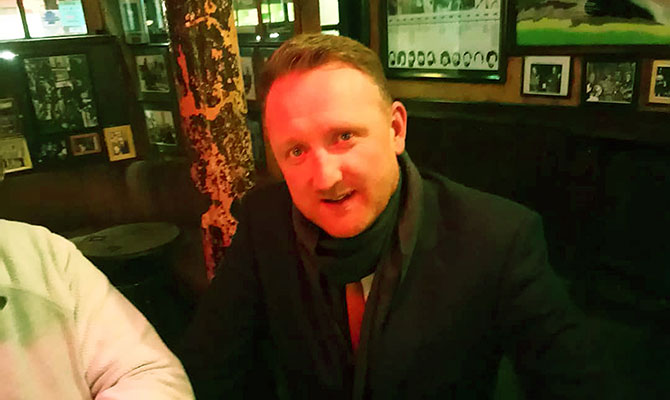
Chay Bowes
‘DESPISE THE FAR RIGHT’
But the anger has been created, and an audience whipped up with the daily diet of fear. Enemies have been signposted. Targets set. We see this from experience in the US and elsewhere. This is how it works. Conservatives set the fire, and others are all too willing to light it. With predictable and damaging consequences.
On New Year’s Eve 2019, McGuirk stated in a tweet “Gript is not far right. I know because I edit it, and I despise the far right”. However, objectively speaking, the distance between Gript and the right in Ireland gets smaller once you look at people directly connected to the project. Take the company’s named director Ide O’Hara, or Ide Nic Mhathúna before marriage. Ide was spokesperson for Youth Defence. Youth Defence was set up by fascist-friendly Justin Barrett, and was an organisation known as much for its street actions as its Catholic fundamentalism and intolerance.
YOUTH DEFENCE LINK
Yet the Youth Defence link extends beyond its former spokesperson sitting as one of the two named directors of Gript. Youth Defence co-founder Niamh Uí Bhriain, formerly Niamh Ní Mhathúna and sister to Ide is a writer with Gript, pushing the same opposition to reproductive health for women. Last month Ide was replaced by Niamh as one of the two directors.
Other regular writers include Ben Scallon, former activist with the right-wing Irish Freedom Party, and ultra-Catholic astroturf organisation headed by Hermann Kelly.
It may be because of the past unfavourable publicity earned by Youth Defence and Barrett that McGuirk made some strident statements on twitter denouncing Barrett. Shortly after the launch of Gript he described Barrett and comrades as a “bunch of extreme right-wing sheep” and said, “the National Party is going nowhere”, unlike the new model conservative McGuirk, it seems.
One hesitates to judge the merits of Bowes’ defamation case against Gript and McGuirk in advance of legal moves, but McGuirk has had mixed experiences with the libel laws and they have involved Goldhawk on more than one occasion. Thirteen long years ago McGuirk, then press officer for Declan Ganley’s Libertas, contacted The Phoenix to demand sight of an article about his boss’s involvement in a bid for an Iraqi mobile phone licence and threatened poor Goldhawk with a prior injunction (which was never carried out). Five years later McGuirk tweeted that following a Young Blood profile of him in the magazine “they [The Phoenix] paid for a nice holiday for me, from the lawsuit”. There was no lawsuit; The Phoenix has never been sued by McGuirk, never mind lost a case against him; nor has the publication ever settled a claim out of court with McGuirk.
Despite his recent effort at moderation, the fundamental McGuirk emerged last December in advance of the Euro championships when he argued that English football fans “should boo” players who take the knee. This is, McGuirk postulated, because taking the knee signifies the view that “our society is a racist one”, something that is “both insulting and deeply inaccurate”.
It looks as though John McGuirk has not really turned into a soggy liberal, after all.
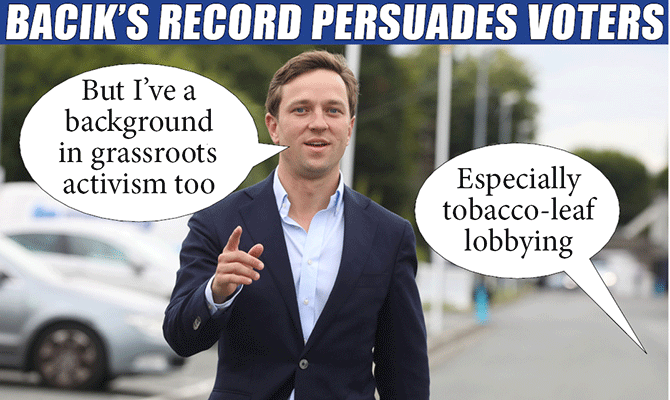
Geoghegan




